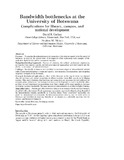Bandwidth bottlenecks at the University of Botswana: complications for library, campus, and national development

View/
Date
2005Author
Gerhan, D.R.
Mutula, S.M.
Publisher
EmeraldType
Published ArticleMetadata
Show full item recordAbstract
Purpose – To examine the technical reasons for excessively slow internet speeds at the University of
Botswana, to discover the present state of development efforts addressing such examples of the
qualitative digital divide, and to recommend remedies.
Design/methodology/ approach – Surveys of students, the authors' professional experiences,
and reports from corporate, public, and intergovernmental organizations provided insights into the effects – and causes – of internet slowdown.
Findings –Bandwidth bottlenecks were identified in successive stages of intercontinental internet traffic. Causes included network design and capacity, telecommunications regulations, and competing
budgetary demands within Botswana.
Research limitations/implications – Much of the literature on the digital divide has stressed plentiful hardware and internet connections in affluent societies versus their scarcity in developing
societies. This study illustrates that hardware and connections are necessary but not sufficient for
adequate online performance. Technological advance and development can each stimulate the other, and that two-way interconnection necessitates more than a simple call for more spending to increase
developing countries' bandwidth. The paper presents recommendations in addition to higher funding.
Originality/value – Student and other micro-level data serve as measures for the local performance
of a global utility, the internet. Tracking message transmission uncovers bottlenecks along the path of the intercontinental internet, specifically as it reaches Africa. These “street-level” approaches can assist the international aid community, the telecommunications industry, and the public sector in
Botswana and elsewhere in removing obstacles to the internet as a potentially important tool for
national- and human-development.
